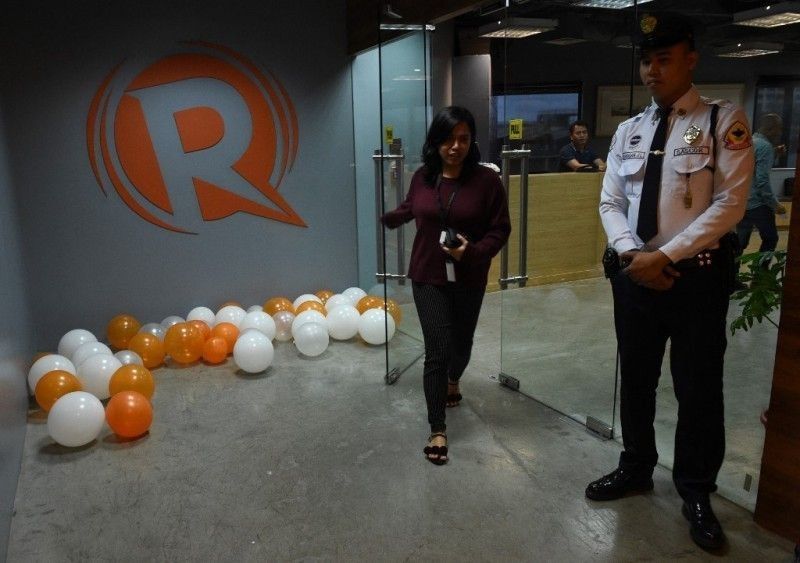In rejecting Ressa appeal, CA says cyber libel can be filed over 15-year-old posts

MANILA, Philippines — In rejecting the appeal of Rappler CEO Maria Ressa and former Rappler researcher Rey Santos, the Court of Appeals held that cyber libel cases may be filed when assailing online articles up to 15 years after publication.
The CA junked Ressa and Santos’ bid to overturn the Manila Regional Trial Court Branch 46’s cyber libel conviction against them, which was promulgated in June 2020.
"The appeal has no merit," the CA’s Fourth Division said in a ruling penned by Associate Justice Roberto Quiroz.
In upholding the conviction, the CA also modified the sentence of Ressa and Santos to suffer the indeterminate penalty of imprisonment ranging from six months and one day in prision correccional in its minimum period, as minimum, to six years, eight months and 20 days of prision mayor in its minimum period, as maximum.
This sentence, in its maximum, is eight months and 20 days longer that what the Manila court meted.
Prescriptive period
In the Manila court ruling that Ressa and Santos appealed, Judge Rainelda Estacio-Montesa said the offense had not yet prescribed, citing Panaguiton Jr. v. Department of Justice that Act No. 3326 applies to offenses punishable by special laws without their own prescriptive periods.
A prescriptive period is the maximum period set by law that legal action, like filing a complaint, can be brought forward. Complaints can no longer be filed after that period.
The Manila court held that republication was present in the case, when Rappler updated its article to correct a typographical error. It went on to determine whether the offense was already prescribed.
"Considering that one degree higher of prision correccional in its minimum and medium periods is prision correccional in its maximum period and prision mayor in its minimum period or 4 years, 2 months and 1 day to 8 years, the offense shall prescribe after 12 years following the provision of Section 1 of Article 3326," the court said.
The CA agreed with the local court that the cybercrime law increased the penalty of libel by one degree, "qualified by the use of information and communication technologies."
This supposedly makes the crime punishable by "prision correctional in its maximum period (from 4 years, 2 months and 1 day to 6 years) to prision mayor in its minimum period from ( 6 years and 1 day to 8 years)."
"Considering the increase of penalty by one degree pursuant to Section 6 of Cybercrime Law, the penalty for cyberlibel becomes afflictive and shall prescribe in 15 years, following Articles 25 and 9 of the Revised Penal Code," it said.
Citing the case Wilbert Tolentino v. People, the CA ruling cited Articles 25 (penalties which may be imposed) and 9 (Grave felonies, less grave felonies and light felonies). This, while the lower court cited Article No. 3326.
The case was seen as a test case for the cyber libel provision of the Cybercrime Prevention Act of 2012.
CA: Story was defamatory
The CA also noted the four elements of libel must also be present in the case.
The case stemmed from a complaint filed by businessman Wilfredo Keng assailing an article that the online news site first published in May 2012 or four months before the cybercrime law was instituted, saying Rappler failed to get his side of the story.
It held that Keng was painted in the story that he sued over "as someone involved in several illegal activities." The CA added: "This fact, in itself, concludes that the subject article is defamatory or libelous per se."
The CA also held that Keng is a private person, and is neither a public figure nor a public official.
"In Keng’s case, it cannot be denied that the subject article was written, republished by the appellants without verifying the truth of the allegations reported therein. In fact, there was no showing that they took the necessary actions to verify the allegations against Keng before publishing the subject article," it also said.
SEC case
The CA ruling came just more than a week since the Securities and Exchange Commission upheld its order to shut down news company Rappler Inc., as the regulatory body “affirmed its earlier decision to revoke the certificates of incorporation of Rappler Inc. and Rappler Holdings Corporation (RHC).”
The SEC case was the first of a slew of cases later filed against Ressa and Rappler.
Rappler continues to operate the news site as of this story’s posting.
- Latest
- Trending




























